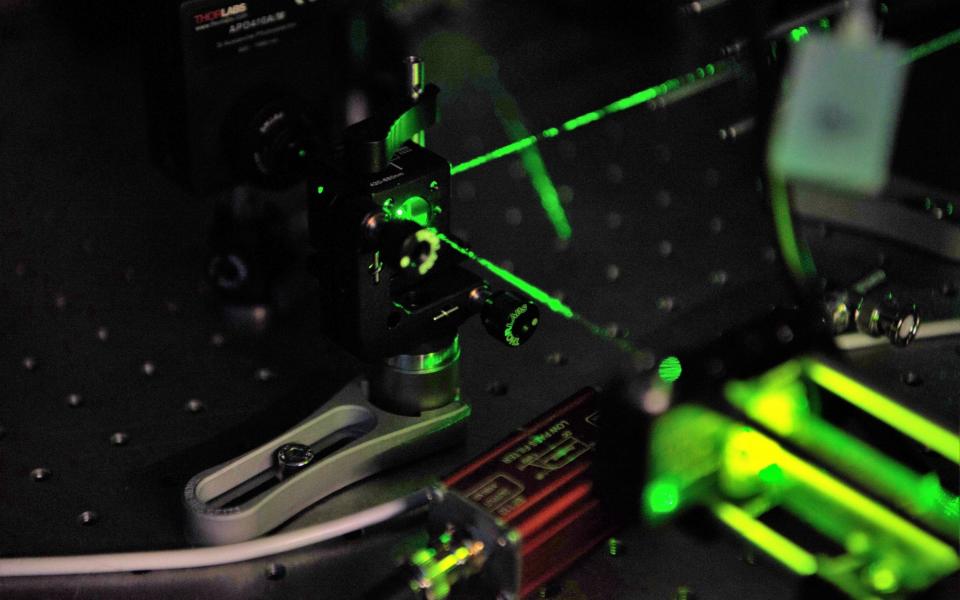Troops on military operations will soon be able to use a British-made atomic clock built with quantum technology instead of GPS for the first time.
The quantum clock, which in the next five years could be used by troops to tell the time, position, and navigate in hostile environments, will dramatically improve intelligence, surveillance, and reconnaissance because it decreases the reliance on GPS technology, which can be disrupted and blocked by adversaries.
The clock’s precision is so refined that it will lose less than one second over billions of years, allowing scientists to measure time at an unprecedented scale.
Developed at the top-secret Defence Science and Technology Laboratory, (Dstl) it is the first device of its kind to be built in the UK and is currently being trialled in partnership with Imperial College London, and quantum technology companies Infleqtion (UK), Aquark Technologies and HCD Research.

“Quantum is really important to the UK, especially from a defence perspective,” said Jonathan, a technical leader for industry partner Infleqtion, who did not give his surname.
ADVERTISEMENT
“If you look at what’s happening in the world at the moment, it’s becoming increasingly obvious that we need better and more robust position navigation and timing services, and that’s something that Quantum is uniquely placed to be able to provide.”
Although it is envisioned that the device will predominantly be used on ships by the Royal Navy, it is hoped that all three services will use it in future operations.
Currently, the military, as well as other critical services, from telecommunications to transport, use Global Navigation Satellite Systems (GNSS) for accurate time and position information.
However, their vulnerabilities are a known national security risk, with the 2018 ‘satellite-derived time and position: Blackett review’ stating that if GNSS were lost it could cost the British economy £1 billion per day. The report also warned of that nation’s dependence on GNSS and the need to adopt “potential backup systems” in the event of a hacking attack.
Now, atomic clock technology has the potential to provide a stable sovereign-controlled capability for the maintenance of precise time for critical operations.
ADVERTISEMENT
Not only can quantum clocks secure communications systems, such as encrypted military networks, but they also have the ability to enhance the accuracy of advanced weapon systems, such as guided missiles, which rely on accurate timing to calculate trajectories and coordinate attacks.

It will also enable the British military to gain an edge over adversaries in timing-critical operations, especially in areas like cyber warfare, where milliseconds can make a difference.
Maria Eagle, the Minister for Defence Procurement and Industry, said: “Integrating cutting-edge technology into existing capabilities exemplifies the Government’s commitment to innovation in the defence sector, and to ensuring our Armed Forces have the best kit possible to keep us secure at home and strong abroad.
“The trialling of this emerging, groundbreaking technology could not only strengthen our operational capability but also drive progress in industry, bolster our science sector, and support high-skilled jobs.”
ADVERTISEMENT
The applications of quantum clocks extend beyond precision timekeeping. According to the Ministry of Defence (MoD), further improvement to GPS accuracy could transform global navigation systems, aiding in everything from satellite communication to aircraft navigation.
In addition, further research will see the technology decrease in size to allow mass manufacturing and miniaturisation, unlocking a wide range of applications, such as those used by military vehicles and aircraft.
Dstl’s Chief Executive Paul Hollinshead said: “This first trial of advanced atomic clock represents a significant achievement in the UK’s quantum technology capabilities.
“The data gathered will not only shape future Defence efforts but is also a signal to industry and academia that we are serious about exploring quantum technologies for secure and resilient operational advantage.”
The ‘Demonstration of Advanced Timing Apparatus’ (DATA) is part of a planned series of experiments designed to understand the performance and limitations of quantum clocks, with potential benefits for military and national infrastructure resilience.
ADVERTISEMENT
Commander Matt Steele, the Future Technology Officer for the Royal Navy’s Office of the Chief Technical Officer, said: “The Navy has been looking at quantum technologies for a number of years and it is exciting to see that the challenges of physics and engineering in this area are now no longer a scientific concept, but is now reaching the cusp of reality.”
“In the next few years, the ability to operate effectively, to survive, and to navigate and also to remain lethal with the use of Quantum alongside GPS will secure operational advantage.”
The UK National Quantum Technologies Programme (NQTP), supported by the MoD, has spent over 10 years advancing the research and development of quantum technologies.
These systems are essential for ensuring future freedom of operation with applications in navigation, sensing, and communications in the future battlefield.
EMEA Tribune is not involved in this news article, it is taken from our partners and or from the News Agencies. Copyright and Credit go to the News Agencies, email news@emeatribune.com Follow our WhatsApp verified Channel




